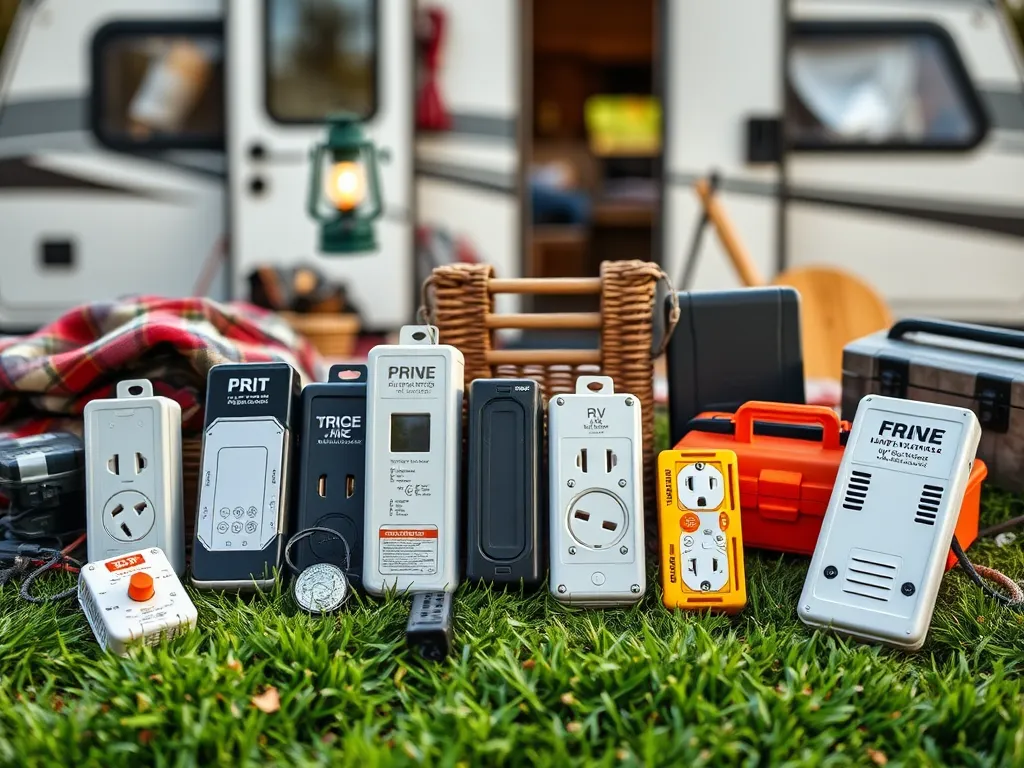
Everything You Need to Know About RV Surge Protectors
As an RV owner, you know how important it is to protect your investment. One of the most vulnerable parts of your RV is its electrical system. Power surges can cause serious damage to your RV's appliances, electronics, and electrical wiring. That's where RV surge protectors come in. These devices are designed to safeguard your RV from sudden spikes in voltage and other electrical issues. In this comprehensive article, we will explore everything you need to know about RV surge protectors, including the different types, key features to consider, installation and usage tips, top brands, and frequently asked questions.
Before buying RV surge protector, it's crucial to know what makes a product reliable.
RV surge protectors are essential for ensuring the longevity and safety of your RV's electrical system. They protect your RV from voltage spikes, power fluctuations, and other electrical problems that can occur when you connect to shore power or use a generator. By installing an RV surge protector, you can have peace of mind knowing that your electrical system is protected.
Many enthusiasts rely heavily on RV surge protector reviews to make informed choices.
There are three main types of RV surge protectors: hardwired surge protectors, portable surge protectors, and plug-and-play surge protectors. Each type has its own advantages and considerations.
Hardwired surge protectors are permanently installed in your RV's electrical system. They provide the highest level of protection and are typically more expensive. Once installed, they are hidden from view and require professional installation. Portable surge protectors, on the other hand, are external devices that you plug into the RV's electrical pedestal. They are convenient and can be easily moved between RVs. Plug-and-play surge protectors are a combination of the two types. They are portable devices with a built-in cord that can be directly plugged into the RV's power source.
Implement RV power safety tips to ensure your trip is safe and enjoyable.
When choosing an RV surge protector, there are several key features to consider. These include voltage protection, amperage capacity, fault indication, weather resistance, and safety certifications. Let's explore each of these features in detail.
Types of RV Surge Protectors
Hardwired surge protectors are permanently installed in your RV's electrical system. They provide the highest level of protection and are typically more expensive than other types. Hardwired surge protectors are designed to handle high voltages and protect your RV from power surges. They are installed by a professional electrician and are hidden from view. Once installed, they provide continuous protection without the need for manual intervention.
Understanding the importance of RV electrical protection is key for maintaining your RV's longevity.
Portable surge protectors are external devices that you plug into the RV's electrical pedestal. They are easy to use and can be moved between RVs. Portable surge protectors are a popular choice among RV owners because of their convenience. They provide effective protection against power surges and other electrical issues. Some portable surge protectors also include additional features such as built-in circuit analyzers and surge indicators.
For your next adventure, don't overlook checking out the Best RV Surge Protectors for optimal power safety.
Plug-and-play surge protectors are a combination of portable and hardwired surge protectors. They are portable devices with a built-in cord that can be directly plugged into the RV's power source. Plug-and-play surge protectors offer the flexibility of portable devices and the added security of hardwired installation. They are typically more expensive than portable surge protectors but provide a higher level of protection for your RV.
Features to Consider
Voltage protection is one of the most important features to consider when choosing an RV surge protector. Look for a surge protector that offers both overvoltage and undervoltage protection. This will ensure that your RV is protected from both high and low voltage situations.
Amperage capacity is another important consideration. Make sure the surge protector can handle the maximum amperage of your RV's electrical system. It's always better to choose a surge protector with a higher amperage capacity to allow for future upgrades.
Fault indication is a useful feature that alerts you to any electrical faults or issues with the surge protector. Look for a surge protector that has LED indicators or a digital display that shows the status of the electrical connection.
Weather resistance is crucial if you plan to use your RV in different weather conditions. Look for a surge protector that is designed to withstand rain, snow, heat, and other outdoor elements. A surge protector with a weatherproof housing will ensure long-lasting protection.
Safety certifications are an important consideration for any electrical device. Look for RV surge protectors that have been tested and certified by independent organizations such as UL (Underwriters Laboratories). These certifications ensure that the surge protector meets safety standards and is reliable for use in your RV.
Installation and Usage Tips
Proper installation is key to maximizing the effectiveness of your RV surge protector. If you choose a hardwired surge protector, hire a professional electrician to install it. They will ensure that the surge protector is correctly wired into your RV's electrical system and provide a safe and reliable installation.
Choosing the right location for installation is also important. The surge protector should be installed as close to the RV's electrical panel as possible. This will provide the most accurate protection and prevent any voltage drops.
Regular maintenance and inspection are necessary to ensure the continued performance of your RV surge protector. Clean the contacts and connections regularly to prevent any buildup of dirt or debris. Inspect the surge protector for any signs of damage or wear, and replace it if necessary.
Follow safe usage tips when using your RV surge protector. Always plug the surge protector into a grounded outlet or power source. Avoid overloading the surge protector by connecting too many devices at once. If the surge protector detects a fault or issue, disconnect the RV from the power source and have the problem resolved before reconnecting.
Top RV Surge Protector Brands
Progressive Industries is a leading brand in the RV surge protector market. They offer a wide range of high-quality surge protectors with advanced features such as voltage and amperage monitoring, surge protection status indicators, and weatherproof construction.
Southwire is another well-known brand in the RV industry. They provide reliable and durable surge protectors that are designed to withstand harsh weather conditions. Southwire surge protectors offer advanced surge protection technology and are easy to use and install.
Camco is a trusted name in the RV community. They offer a variety of surge protectors that cater to different RV sizes and electrical systems. Camco surge protectors are known for their durability and effectiveness in protecting RVs from power surges.
Hughes Autoformer is a popular choice among RV owners. They specialize in voltage boosters and surge protectors that enhance the performance and safety of RV electrical systems. Hughes Autoformer surge protectors are known for their reliability and effectiveness in preventing electrical damage.
RV Surge Protector FAQs
An RV surge protector is a device that protects your RV's electrical system from power surges, voltage spikes, and other electrical issues. It is essential for ensuring the safety and longevity of your RV's appliances, electronics, and wiring. Without a surge protector, your RV is vulnerable to electrical damage that can be costly to repair.
An RV surge protector works by monitoring the voltage levels of the incoming power. If it detects a voltage spike or surge, it immediately diverts the excess voltage to the ground, protecting your RV's electrical system. Some surge protectors also have built-in circuit analyzers that can detect wiring issues or electrical faults.
Yes, RV surge protectors protect against power surges and low voltage. They monitor the voltage levels and automatically disconnect the RV from the power source if there are any fluctuations or abnormalities. This protects your RV's appliances and electronics from damage caused by high or low voltages.
Yes, you can use an RV surge protector with a generator. In fact, it is highly recommended to use a surge protector when using a generator to prevent any electrical issues that may occur. Just make sure the surge protector is compatible with the generator and can handle the generator's output.
RV surge protectors are relatively easy to install. Portable and plug-and-play surge protectors can be simply plugged into the RV's electrical pedestal or power source. Hardwired surge protectors require professional installation by a qualified electrician. It is recommended to hire a professional to ensure the surge protector is installed correctly and safely.
The lifespan of an RV surge protector depends on various factors such as usage, weather conditions, and quality of the device. It is generally recommended to replace the surge protector every 3-5 years to ensure optimal performance and protection. However, if you notice any signs of damage or malfunction, it is important to replace the surge protector immediately.
While an RV power management system may provide some level of surge protection, it is still recommended to use a dedicated RV surge protector. RV surge protectors offer additional features such as fault indication, weather resistance, and higher level of protection. They provide an extra layer of protection for your RV's electrical system and appliances.
